MercoPress. South Atlantic News Agency
Tag: Argentina inflation
-
Monday, May 27th 2019 - 03:32 UTC
New setback for Argentina's economy shown in leading report
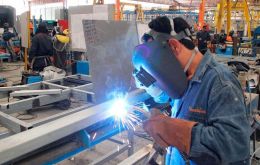
Argentina's beleaguered industrial activity fell 10.3% in April due to the peso's devaluation coupled with rampant inflation, the Argentine Confederation of the Medium-Size Company (CAME) reported over the weekend.
-
Monday, April 22nd 2019 - 09:15 UTC
Argentina’s president attempts to improve his fading chances of re-election (*)

Mauricio Macri's original plan was to address Argentina’s citizens on television on the final working day before the Easter break. But he opted for a folksier way of presenting an economic package that he hopes will rescue his chances of being re-elected president in October. He appeared in a taped video, knocking on the door of a house belonging to a young working-class couple, then sitting down with them to explain his plan.
-
Friday, December 28th 2018 - 09:20 UTC
Argentina's economic activity in October falls 4%, year-on-year

Economic activity in Argentina fell 4.0% in October versus the same month last year, the government said on Thursday, marking the seventh straight month of declines as the country grapples with recession and high inflation.
-
Friday, October 19th 2018 - 10:18 UTC
Dollar, prices go up in inflation-ridden Argentina
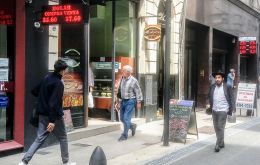
The US dollar rose 22 cents against the Argentine peso and closed at a 1 US$/ AR$37.50 parity on Thursday. It was the second day in a row for an upward trend following seven straight slumps.
-
Thursday, October 18th 2018 - 07:36 UTC
Argentina with a record 6.5% inflation in September, and 40.5% in twelve months

Argentina says that consumer prices rose 6.5% in September bringing the twelve month inflation rate to 40.5%, one of the world's highest. The inflation rate published by the official statistics agency Indec, on Wednesday follows a sharp devaluation of Argentina's currency. The nine month rate reached 32.4%.
-
Friday, August 17th 2018 - 08:58 UTC
Argentina struggling to tame markets and inflation; talks for a currency swap with China
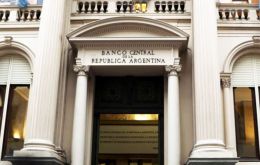
Argentina’s central bank said on Thursday it hiked reserve requirements by 3 percentage points for the country’s largest banks, as it tries to keep its plan for reducing short-term debt from adding to already high inflation.
-
Thursday, August 2nd 2018 - 07:24 UTC
Macri admits annual inflation will reach 30%, “product of this storm”
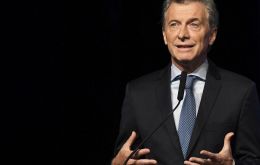
Argentina's President Mauricio Macri is acknowledging for the first time that the country's annual inflation rate will be 30%. Macri said Tuesday that the high consumer prices “unfortunately are a product of this storm.” He was referring to a sharp devaluation of Argentina's currency and a recent run on the Peso.
-
Friday, May 4th 2018 - 09:00 UTC
Argentine Peso tumbles 7.83% to US dollar; central bank raises rate to 33.25%
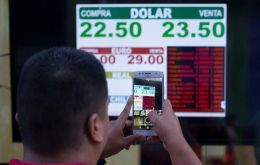
Argentina’s central bank raised its benchmark interest rate by 300 basis points to 33.25% percent on Thursday, but the second steep rate increase in less than a week failed to stop the country’s peso currency from swooning to a record low. The local currency tumbled 7.83% to 23 per U.S. dollar. It had hit 21.2 to the greenback on Wednesday, the first trading day due to a holiday after the bank hiked the rate to 30.25% from 27.25% on Friday.
-
Thursday, May 3rd 2018 - 08:39 UTC
Lack of investor confidence sees the Argentine Peso fall 3.11% against the dollar
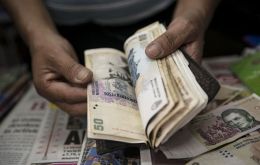
Argentina’s peso currency closed down 3.11% on Wednesday at an all-time low of 21.2 per U.S. dollar, even as the central bank continued selling dollars to try to halt the slide of the local currency, traders said. The currency’s sustained weakening showed a lack of investor confidence in Latin America’s third largest economy, which is blighted by one of the world’s highest inflation rates.
-
Wednesday, April 25th 2018 - 08:46 UTC
Argentina central bank holds benchmark rate at 27.25%; economy expands 4.7% in first two months
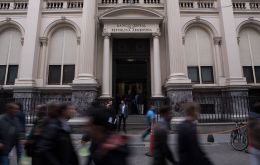
Argentina’s central bank held its benchmark interest rate at 27.25% on Tuesday, reiterating in a statement that high-frequency indicators suggested core inflation would remain high in April, but below March levels.
